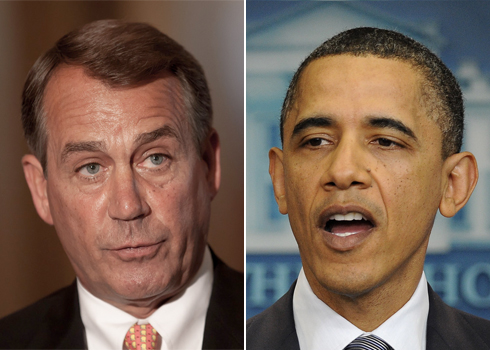President Obama and Speaker John Boehner (R-OH) are calling in the heavy artillery in their own war of words over Libya and whether the White House has the power to thumb its nose at Constitutional requirements that Congress approve the use of military force.
At a briefing with reporters Thursday, White House spokesman Jay Carney read a statement from Boehner from 1999 in which he questioned the Constitutional issues surrounding the War Powers Act. That law prohibits the President from committing the military to actions for more than 60 days, plus a 30-day extension, without congressional approval. The U.S. involvement in the Libyan conflict has lasted for nearly three months.
The White House says Boehner’s criticism of Obama’s decision to take military action in Libya directly contradicts his position in 1999. At the time, they say, Boehner expressed concern about the actions President Clinton was taking in the Balkans, but he didn’t urge Congress to impose its will on the White House, because it would have eroded the President’s power as commander-in-chief.
“It’s important to know what his views were then,” Carney said, noting that the White House has consulted with Congress on the action taken in Libya more than 40 times.
Earlier Thursday, Boehner said he wasn’t buying Obama’s explanation that the U.S. involvement in NATO-led action in Libya didn’t reach the threshold definition of a war as outlined in the War Powers Act.
Even that might not be enough, though. With the U.S. participating in drone attacks and spending millions a day in Libya, Boehner said it, “doesn’t pass the straight-face test to me that we’re not in the midst of hostilities.”
Next week, Boehner also said, the House may be prepared to take action to block the administration’s intervention — and one option he’s looking at is cutting off funds.
“[T]he ultimate option is the House in fact — the Congress has the power of the purse,” Boehner told reporters at a Capitol press briefing. “And certainly that is an option as well.”
After Carney’s briefing, a Boehner spokesman fired another shot, reminding reporters that Obama, not so long ago, had been a huge champion of Congress standing up to presidents and trying to force them to win Congressional approval for military action.
“…I think it’s worth remembering what President Obama said before becoming commander-in-chief,” said Boehner spokesman Brendan Buck. “As Speaker, it is Boehner’s responsibility to see that the law is followed, regardless if he has concerns with it.”
Buck then churned up an Obama quote from 2007 urging Congress to hold the administration accountable on Congressional approval for military action.
“We thought we learned this lesson,” Obama said at the time. “After Vietnam, Congress swore it would never again be duped into war, and even wrote a new law — the War Powers Act — to ensure it would not repeat its mistakes. But no law can force a Congress to stand up to the president. No law can make senators read the intelligence that showed the president was overstating the case for war. No law can give Congress a backbone if it refuses to stand up as the co-equal branch the Constitution made it.”
Boehner told reporters Thursday that Obama still hasn’t answered a key question — whether his top lawyers agree with his argument that the U.S. is in a supporting role in the NATO-led bombing mission and therefore U.S. forces are not facing the “hostilities” that would require Congressional approval.
“The administration gave its opinion on the War Powers Resolution, but didn’t answer the question in my letter as whether the Office of Legal Counsel agrees with them,” Boehner said. “So I’m looking forward to an answer on this by tomorrow.”
But Carney made it clear the White House had no plans to accede to Boehner’s demands on Libya.
“We have consulted regularly with Congress…,” he said. “I don’t expect further elucidation of our legal reasoning.”









